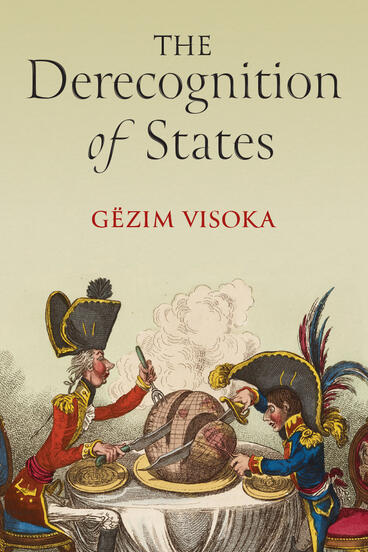The Derecognition of States
When and why do states lose recognition?
Description
Although a great deal is known about the recognition of states, less is known about the practice of derecognition of states, namely why and how states withdraw the recognition of other contested and partially recognized states. The Derecognition of States offers a global and comparative outlook of this unexplored diplomatic practice. Using original empirical research, it addresses the complex processes, justifications, and consequences of state derecognition. In particular, it provides unique insights into five aspirant states facing withdrawal of recognition: Taiwan, Western Sahara, Abkhazia, South Ossetia, and Kosovo.
Gëzim Visoka argues that state derecognition is a highly controversial and unstable practice that has less to do with the unfulfillment of the conditions of statehood by the claimant than with the advancement of the self-interest of the former base state and derecognizing state. The derecognition of states is not a rule; rather, it is an exception in international diplomacy, driven by political expediency and is incompatible with original rationales for granting recognition. Yet, the derecognition of states is far more important than previously recognized in shaping the reversal dynamics of secession and state creation and in influencing regional peace, geopolitical rivalries, and the international order. By analyzing the withdrawal of recognition, the book offers a window into the reversal politics of unbecoming a sovereign state and how the arbitrary beginning and the end of diplomatic relations between states take place.
Gëzim Visoka is Associate Professor of Peace and Conflict Studies at Dublin City University.
Reviews
“The Derecognition of States offers an in-depth account of derecognition and contributes to debates on contested, de facto states as well as conflict studies.”
- George Kyris, University of Birmingham
“In the current international disorder, the game of recognizing, not recognizing, or derecognizing other states has too often become a matter of political expediency or, even worse, a way of shaking up international institutions and norms. Gëzim Visoka’s The Derecognition of States shows us how the seemingly marginal practice of derecognizing states has a geopolitical domino effect that unsettles international law and any pretense of international order. The book is a must read for anyone trying to understand how that order can be turned inside-out by the very rules meant to preserve it.”
- Rebecca Bryant, Utrecht University
“Gaining recognition and joining the sovereignty club is vital for aspiring nations. But whereas most research has examined the dynamics of admission, the reverse process of derecognition has been neglected. With this marvelous book, Visoka explains how states are gradually removed from the club. A must-read for scholars and practitioners!”
- Ryan Griffiths, Syracuse University
“The Derecognition of States provides careful comparative case studies of four contentions featuring claims to have derecognized a state focused on Taiwan, the Sahrawi Democratic Republic (Western Sahara), Kosovo, and the twin examples of Abkhazia and South Ossetia. They reveal a common process of contention marked by unashamed inconsistency and rampant opportunism illuminating the significance of international law rules by showing what happens in their absence.”
- MJ Peterson, University of Massachusetts Amherst
“Gёzim Visoka breaks new ground in recognition studies by offering the first book-length study of state derecognition. It is bound to be of interest to scholars and students of international relations, diplomacy, and international law.”
- Mikulas Fabry, Georgia Institute of Technology

